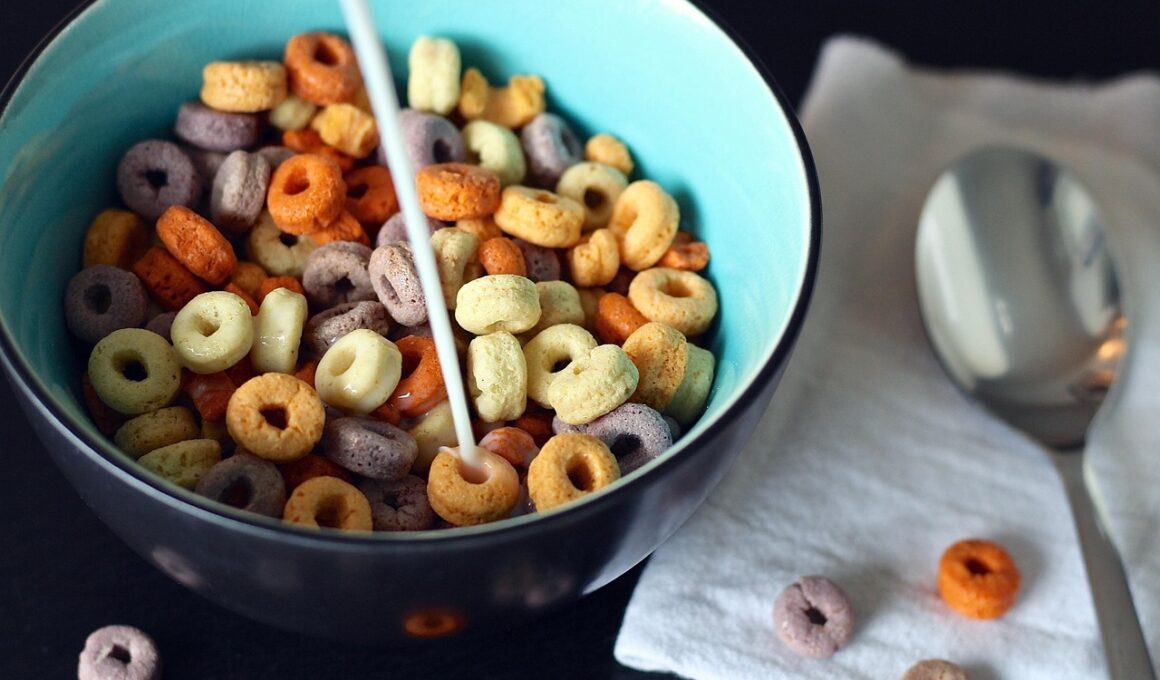Myth: Breakfast Cereals Cause Hyperactivity in Children
One of the most pervasive myths surrounding breakfast cereals is the belief that they contribute to hyperactivity in children. Parents often express concern that sugary cereals lead to increased energy levels and hyperactivity. However, research studies consistently show that there is no direct causal relationship between breakfast cereals and hyperactivity. According to experts, the idea that sugar is solely responsible for this behavior is largely exaggerated. Hyperactivity in children can be influenced by various factors, including environment and individual temperament. Many breakfast cereals contain a variety of nutrients, including vitamins and minerals which are beneficial for children’s development. It is essential for parents to evaluate their child’s overall diet and behavior rather than attributing hyperactivity to breakfast cereals alone. In moderating sugar intake, choosing whole grain options without added sugars can provide balanced nutrition. Many cereals feature lower sugar alternatives that are still tasty and satisfying. Parents are encouraged to focus on a well-rounded breakfast that includes proteins, healthy fats, and complex carbohydrates. This approach ensures that children have sustained energy throughout the day without resorting to an excessive sugar load.
Another factor to consider when debunking the myth that breakfast cereals cause hyperactivity is the role of marketing and media portrayal. Advertisements often target children with colorful mascots and catchy jingles, making cereals appear more appealing. As a result, parents might unintentionally associate these products with hyperactivity after observing children’s reactions to advertisements. However, this perception doesn’t translate into reality. Researchers emphasize that hyperactivity is a complex issue, often linked to larger factors such as genetics and family dynamics. While some cereals do contain added sugars, these are not the sole reason for a child’s energetic behavior. Many children naturally exhibit bursts of energy regardless of their diet. Parents can mitigate any concerns by providing a balanced breakfast that includes fiber-rich fruits, yogurt, or nuts alongside cereals. Making breakfast an opportunity for family interaction can also reduce the focus on the cereal itself, allowing children to touch on different food groups. Education around healthy choices—a more well-rounded breakfast approach—can empower families to make better choices rather than simply relying on myths based around one specific food product.
To further understand the nutritional values of breakfast cereals, it’s crucial to look at how they contribute to overall health and wellness. Whole grain cereals, for example, provide essential nutrients required for a child’s growth and development. The myth suggesting cereals induce hyperactivity can lead families to miss out on the positive impacts of breakfast. Many cereals are fortified with vitamins such as B vitamins, iron, and folic acid, all of which play a vital role in cognitive function and energy metabolism. Additionally, proper nutrition can assist in stabilizing blood sugar levels, potentially preventing spikes that may lead to hyperactivity. Incorporating cereals with higher levels of fiber can also boost satiety, keeping children energized and focused longer. Thus, it’s crucial to choose cereals that prioritize whole grains and nutritional value over those with high sugar content. A proactive approach in selecting breakfast cereals allows families to avoid common pitfalls and myths surrounding children’s energy levels. Parents should read food labels carefully and choose options that list whole grains as the primary ingredient, ensuring a nutritious start to the day.
The Influence of Lifestyle on Children’s Behavior
Aside from dietary choices, lifestyle factors significantly influence behavior in children. The integration of regular physical activity, adequate sleep, and structured routines helps manage energy levels, ultimately contributing to reduced instances of hyperactivity. If a child maintains an active lifestyle, this can counteract any temporary spikes in sugar consumption from breakfast cereals. Furthermore, creating a morning routine that includes time for relaxation and a healthy breakfast can set a positive tone for the day. Engaging children in physical activities helps stabilize their energy and promotes focus throughout their daily activities. Parents should aim to embed these healthy habits into their children’s routines, emphasizing the importance of balance in their lifestyle. This can lead to enhanced academic performance and improved emotional well-being. It is through this holistic approach that families can alleviate concerns surrounding hyperactivity, which might be mistakenly attributed solely to breakfast cereal consumption. Encouraging children to partake in team sports or outdoor play gives them a channel for any excess energy they may exhibit. Establishing a measured daily routine helps foster better behavior and sets expectations for children.
Research shows that diet and behavior are closely linked, but generalization often leads to mislabeling specific foods as causes of hyperactivity. Interventions aimed at improving nutrition should focus on diverse dietary patterns, rather than singling out breakfast cereals. The role of breakfast in promoting cognitive function cannot be ignored. Children who skip breakfast may struggle with concentration, leading to behavioral issues often mistaken for hyperactivity. Providing wholesome breakfasts ensures that children receive the energy they need for optimal performance in school and daily activities. Whole grain cereals can play a role in this by allowing prolonged release of energy, thereby mitigating sugar-related spikes. It’s crucial to understand that hyperactivity can stem from numerous sources, including environmental stimuli, stress, or changes in routine. Parents should monitor behavioral patterns closely to distinguish between situational and diet-related issues rather than prematurely attributing hyperactivity to breakfast cereals. Emphasizing the importance of balanced meals and encouraging mindful eating habits can transform the way families view breakfast foods. Through proper education and awareness, the stigma against breakfast cereals can diminish.
When considering children’s nutrition, it’s not just about what they eat but also how the food is integrated into their overall lifestyle. Many experts advocate for breakfast that includes a variety of food groups—such as proteins, whole grains, healthy fats, alongside cereals—that supports better focus and behavior. The myth that cereals contribute to hyperactivity can be dispelled by highlighting the numerous benefits of such integrated meals. Parents can involve children in preparing breakfast, allowing them the chance to make informed choices about what they consume. If children feel empowered to make decisions about their food, they may have a more positive relationship with eating. Additionally, discussing healthy food choices openly can help children understand the impact of their diet on behavior. Engaging with kids about their meals promotes curiosity and encourages them to choose foods that help sustain energy levels without becoming hyperactive. As such, bridging the gap between healthy eating and children’s preferences is essential. In this way, families can steer clear of myths about breakfast cereals while instilling beneficial habits that support both health and behavior.
Conclusion and Practical Recommendations
To summarize, the belief that breakfast cereals cause hyperactivity in children is more myth than fact. A deeper understanding of diet, lifestyle, and overall nutrition reveals that cereals, particularly when chosen wisely, can contribute to healthy eating habits. Parents are encouraged to focus on creating balanced breakfasts and staying mindful of their children’s overall dietary patterns. By involving children in meal preparation, emphasizing nutritional education, and understanding the complexities surrounding hyperactivity, families can foster healthier relationships with food. Careful reading of food labels for cereals helps in avoiding products that contain excessive sugars while making educated choices. Labels should highlight whole grains as a primary ingredient to reap the benefits of breakfast cereals. Overall, cultivating a balanced approach to nutrition and physical activity minimizes the potential confusion regarding hyperactivity. In supporting children’s dietary needs, families can focus on well-being and overall health rather than perpetuating unfounded myths. This approach serves as a guideline for practical, health-conscious decisions regarding breakfast cereals, ensuring children receive the essential nutrients for optimal performance.
In conclusion, the narrative that breakfast cereals cause hyperactivity fails to account for numerous other influencing factors. Parents play a crucial role in shaping their children’s diets, understanding how balanced meals can lead to better moods and behavior. Breakfast is vital for fueling children’s brains, allowing them to thrive in learning environments. Healthy eating patterns developed early on can have lasting impacts on children’s health as they grow older. Instead of focusing on misconceptions, it’s time to prioritize nutritional awareness. Efforts should focus on fostering habits that embrace variety and moderation, ensuring children enjoy meals that are both nutritious and delicious. Consistent education around dietary choices benefits not only children but also families as a whole. Parents should advocate for thoughtful discussions around food, nutrition, and health within their families. By creating comfort around breakfast foods and experimenting with recipes that children enjoy, any stigma surrounding breakfast cereals can diminish significantly. The overall message should be one of balance, moderation, and education. This ensures that children can learn the importance of nutrition and their food choices, empowering them for healthier futures.


